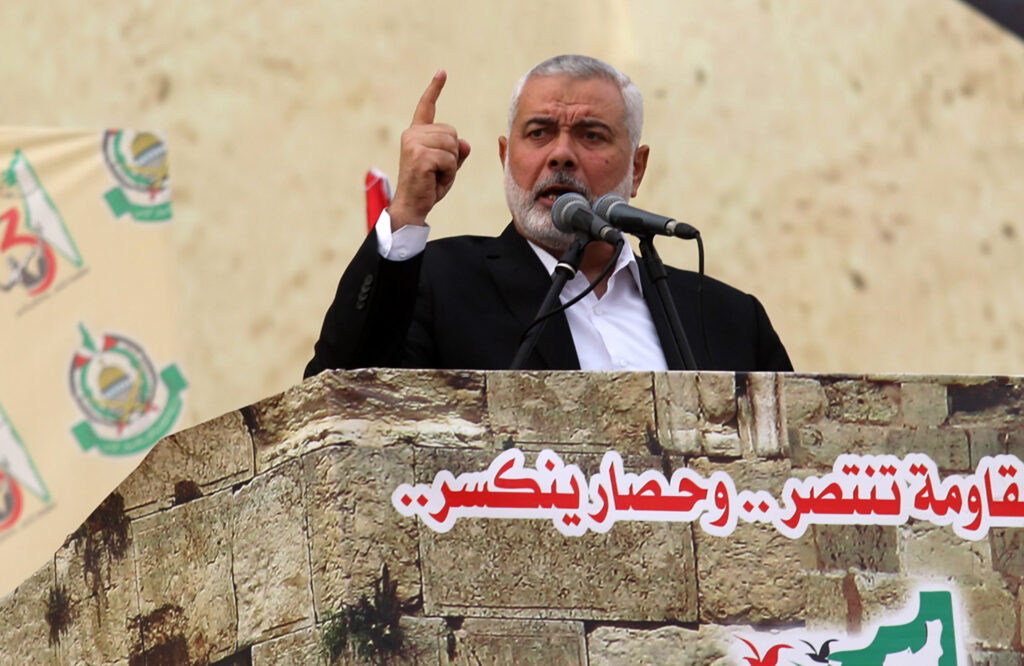Australia/Israel Review
Who was Ismail Haniyeh?
Aug 14, 2024 | Ksenia Svetlova

The first and the only time I interviewed Ismail Haniyeh, the late head of Hamas’ political bureau, was in January 2006 in Gaza, on the day of the fateful elections for the Palestinian Parliament, shortly after exit poll results were published.
Like every other member of Hamas, Haniyeh was overwhelmed by this unexpected victory. Hamas had been aiming for a significant increase in power in the Parliament, but it did not expect an outright victory. Haniyeh nevertheless sounded extremely smug and full of himself. He ordered me and a few other female journalists present in the room to cover our heads. Many other Hamas leaders never made such a demand.
During the interview, he promised that under Hamas leadership, Gaza and the Palestinian people would conquer new heights, and he personally promised to follow in the footsteps of the “martyrs” – Sheikh Ahmed Yassin and Dr. Abd al-Aziz al-Rantisi, two Hamas founders who were assassinated in spring of 2004.
During a rule that formally lasted 18 years, Haniyeh definitely took Gaza to new heights of failure, misery and devastation, while enriching himself and his family.
Humble origins, quick rise to power
Born in 1962 in al-Shati refugee camp in Gaza to a family of refugees from al-Jura village, located next to the Israeli town of Ashkelon, Haniyeh grew up in poverty. His father, a fisherman, died when he was still a child and as a youngster, he worked in construction in Israel to support his family.
Haniyeh got involved in politics early on – he was active in the Muslim Brotherhood movement as a university student. During the First Intifada (1988-1992), he joined Hamas and anti-Israeli protests in the Strip, landing him in an Israeli prison where he served a three-year sentence.
Ismail Haniyeh became one of the terror group’s young stars. In 1992 he was exiled to southern Lebanon along with hundreds of top activists. Under heavy American pressure, Israeli Prime Minister Yitzhak Rabin repatriated the exiled group back to Israel. Upon return to Gaza, he was appointed dean of the Islamic University. In 1997, Haniyeh began serving as the right hand of Hamas spiritual leader Sheikh Ahmed Yassin. Proximity to Yassin did wonders for his career: after both Yassin and Rantisi were assassinated, Haniyeh became a de-facto leader of Gaza.
Following Hamas’ win in the 2006 elections, he was appointed to the post of Palestinian Authority Prime Minister. Sixteen months later, when Hamas overthrew the Palestinian Authority in Gaza in a coup d’état, Haniyeh became Prime Minister of the Hamas-led government of Gaza and the political leader of Hamas in Palestine.
The making of an extremist
“We do not have any feelings of animosity toward Jews. We do not wish to throw them into the sea. All we seek is to be given our land back, not to harm anybody,” Ismail Haniyeh told Newsweek back in 2006, soon after the Palestinian parliamentary elections. Thus began a narrative in the West that Haniyeh was moderate, open to negotiations and even to some form of peace settlement with Israel. Yet, Hamas under Haniyeh refused the conditions set by the roadmap of the international Quartet on the Middle East – a halt to terrorist activity and acceptance of Israel.
In 2006, the same Ismail Haniyeh vowed during a visit to Iran not to recognise Israel, and during a 2012 visit to Tunisia promised to continue the armed struggle and never cede a single part of Palestine.
Before and after the elections of January 2006, Haniyeh promised the Palestinians that Hamas had a development plan for Gaza, that international aid would be plentiful, and that the Palestinian state would soon be a reality. But the group’s military activity ensured that life in Gaza would become much more difficult. By June 2006, terrorists came out of a tunnel into Israel and kidnapped Israeli soldier Gilad Shalit back to Gaza. Hamas increased the shelling of Israeli border towns with Qassam rockets, and built more underground tunnels for both smuggling and military purposes. One of the results of this policy was Israel’s maritime blockade to prevent the smuggling of weapons on a commercial scale.
Pivot to Iran and a new lifestyle
The romance between Iran and Hamas began in the 1990s – at the time, an uneasy romance between a hardcore Sunni movement and a Shi’a fundamentalist regime. In 1998, after his visit to Teheran, Sheikh Yassin said that “the Islamic Republic of Iran supports this ideal [of a Palestinian state] even more than the Palestinians themselves.” Yet at the same time, sources close to him indicated that he was always wary of the Iranians and preferred to seek funding elsewhere.
His successor Ismail Haniyeh had a different opinion. Under his leadership, Iran increased funding.
While Gaza-based Yahya Sinwar was rightfully labelled an extremist, Ismail Haniyeh, who travelled abroad and dressed in expensive suits, was deemed to be a more moderate figure. The truth is that both worked for the same goal – turning the Gaza Strip into a large military base and Hamas into an army that trained to kidnap Israelis, take over Israeli border communities and shell Israeli towns with technologies provided with the help of Teheran.
A word about those fancy suits. Although Hamas ran in 2006 on an anti-corruption ticket, very soon it became just as corrupt as the nationalist Fatah movement.
Back in 2010, Haniyeh spent four million US dollars to buy a plot of land on the Gazan beachfront near al-Shati refugee camp where he grew up. He registered the land under his son-in-law’s name. Since then, he purchased several apartments, villas and buildings in the Gaza Strip and registered the property in the names of some of his 13 children.
Publicly, he pledged to survive on olive oil and za’atar (dried herbs), while in private he kept amassing enormous wealth.
Haniyeh was not “moderate” in any context. His successor, however, looks even worse.
Just little over a week after Haniyeh’s assassination, Hamas announced that Yahya Sinwar, the architect of October 7, is the new head of the political bureau. Sinwar will be different to his predecessors, Khaled Masha’al and Ismail Haniyeh: isolated in his Gaza tunnel, hard to reach, hungry to keep all power in his own hands. Sinwar wishes to consolidate the organisation’s power that used to be dispersed among leaders in Gaza, West Bank, Israeli prisons and the diaspora.
Sinwar’s uncompromising and zealous type of leadership might bring the end of Hamas closer, for Sinwar will not listen to any voices of reason, but will seek death and destruction, for Hamas and for the entire region.






